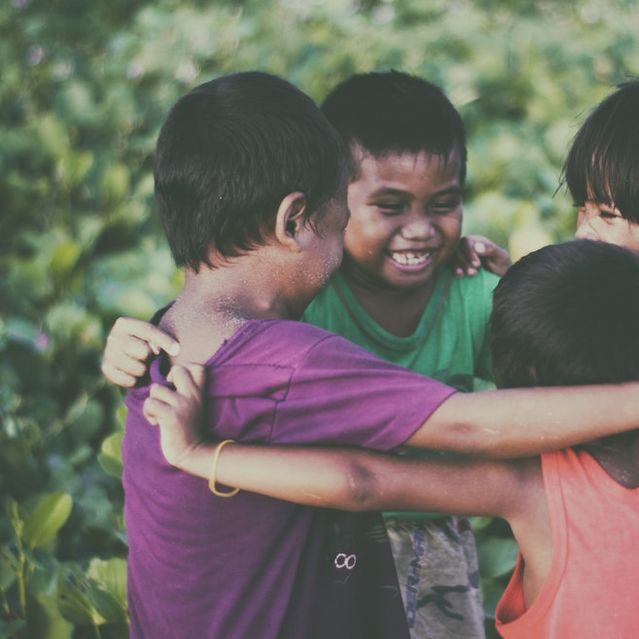Empathy
How Kids Learn to Cope With Peer Conflict at Home
A new study shows parental guidance reduces peer hostility in social situations.
Posted June 29, 2018

It should come as no surprise that young children make social errors at times. Childhood is a time of social and emotional growth, and social skills can be a work in progress clear through adolescence.
Toddlers don’t always enjoy sharing in the ways adult want them to. They tend to play side-by-side, interacting in quick glances, questions, and grabbing for interesting things. Those quick grabs are not a sign of anything sinister, however. Toddlers don’t yet have the language and self-regulation skills to say, “May I please borrow that really interesting toy when you’re finished with it,” and then wait ten more minutes. Ten minutes is forever for a toddler.
Preschoolers enjoy talking, singing, playing, and more talking. They learn at a rapid pace and love to share their findings with anyone who will listen. They don’t, on the other hand, spend a ton of time considering things like listening skills, delayed gratification, and following directions the first time. This can result in impulsive choices, hurt feelings, and debates about the justice of it all.
Parents often ask me if early social errors are a sign of future social struggles. Does a child who dominates the play in preschool grow up to bully other kids? Does a child who sticks close to mom and dad in the early years grow into a child with social anxiety? While parents are socialized to overthink every little behavior they see in their kids, it’s important to remember two things: (1) Childhood is largely based on trial and error and making mistakes is part of the learning process, and (2) Children learn a lot about navigating their social worlds by seeking guidance from their parents.
In fact, results of a new study published in Child Development show that how parents engage with their children about peer provocation makes a big difference in how children interpret the motivations of their peers. 270 Dutch parents and their 4 to 6-year-old children were given picture books with four short stories. One group was asked to discuss positive interpretations of the stories (ex: the social problem was accidental) after reading to their kids, a second group was asked to discuss norms and values (ex: aggression is wrong, sharing is good), and a third group was asked to simply tell the stories without any discussion or interpretation. Researchers found that children made less hostile interpretations of the peer interactions in the stories when parents discussed positive reasons for the behaviors or discussed norms and values.
While it’s natural to assume that learning to manage conflict and heated emotions with peers occurs when kids are playing together, parents help their kids develop conflict resolution, empathy, and social skills at home by helping them understand the “why” hidden beneath negative behavior.
Try these strategies with your kids to build empathy and understanding and reduce hostile interpretations of peer interactions:
Play social detectives:
It’s natural for young children to have bug reactions to seemingly small slights. It takes time and practice to develop both emotion regulation skills and impulse control skills. Blaming, personalizing, and engaging in black and white thinking are all common responses to social missteps in young children.
Try playing a game of social detectives the next time you’re out for a day at the park with your child. Imaginary play is a great way to help kids work through emotions and build social skills. When a social issue arises in the tot lot, pull your child aside and say, “Let’s put on our detective hats and figure out why this happened.” Look for clues. Is the other child hungry? Tired? Lonely? Is there only one piece of chalk to go around and too much waiting? Help your child find the root of the behavior and brainstorm solutions.
Read with empathic interpretations:
Reading is one of the best ways to build empathy and explore the “why” beneath friendship troubles. One mistake that’s easy to make is to read for the sake of word identification and building early reading skills. Parents are conditioned to connect words to build word recognition in young children, but the beauty of reading aloud to young children is that stories help them view the world through a different lens.
Slow down when you read. Get to know the characters. Talk about the plot and point out the individual stories beneath the central storyline. In talking about the small details of the story, kids learn to engage in perspective taking and consider all points of view before making a judgment.
Create social stories:
Art can be a wonderful vehicle for working through complicated emotions. Drawing social stories is a great way to review something that happened and choose a different ending for the next time.
Fold a piece of paper until you have six boxes. In the first box, have your child draw the scene of the friendship misstep (ex: the playground.) In the next box, have your child draw who was there and what was happening. Continue box by box until your child identifies the “problem box”. This is where the social problem occurred. Talk about the problem box for a few minutes and then ask your child to choose a different ending.
When parents guide their kids through the process of coping with peer conflict, kids learn how to preserve their friendships and tap into empathy during difficult moments. This is a skill that will last a lifetime.
References
"Does Parent-Child Discussion of Peer Provocations Reduce Young Children’s Hostile Attributional Bias?" by van Dijk, A, Poorthuis, AMG, Thomaes, S, and Orbio de Castro, B (Utrecht University). Child Development. Copyright 2018 The Society for Research in Child Development, Inc. All rights reserved.




